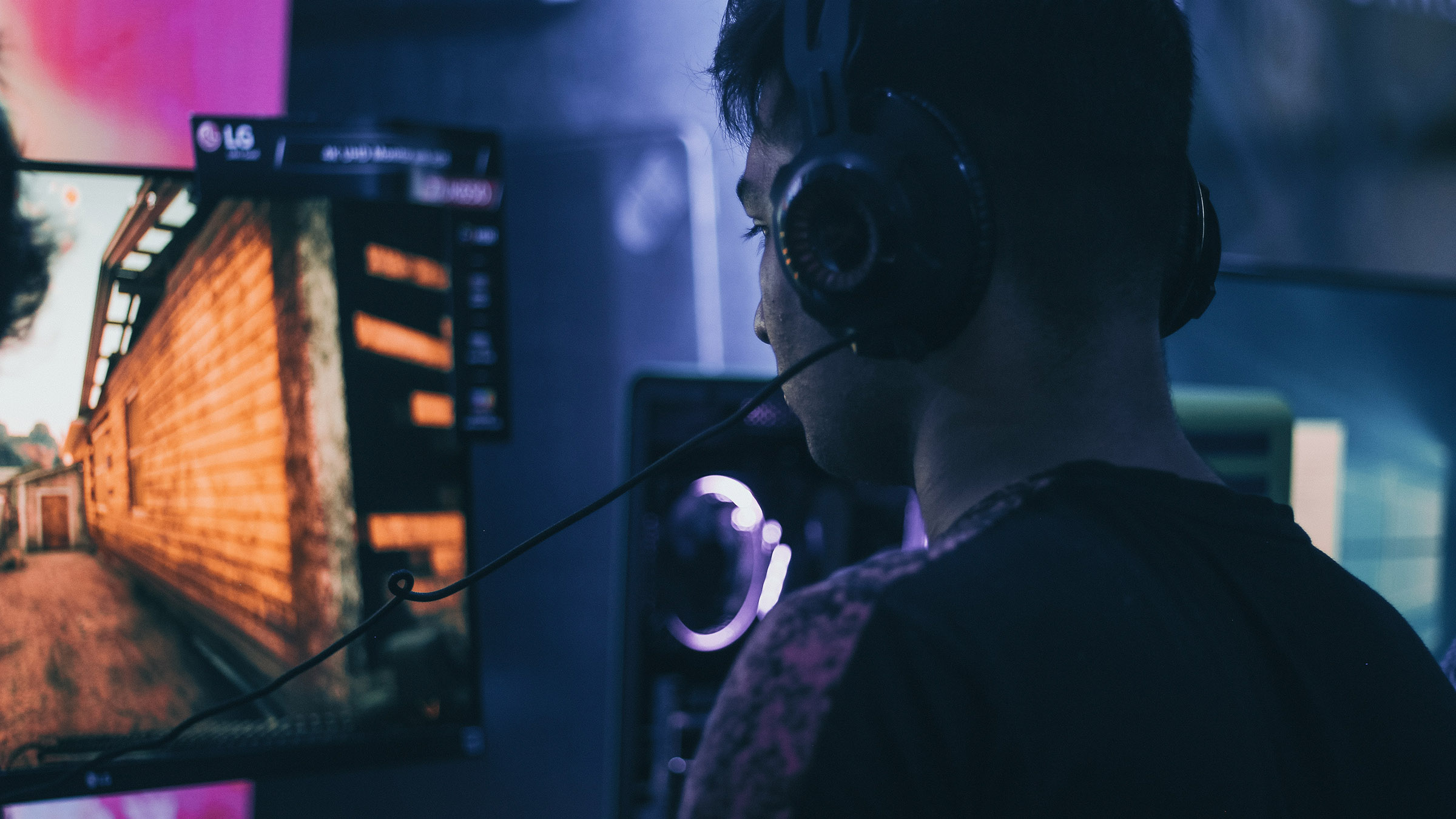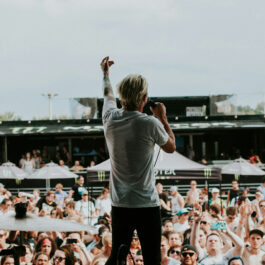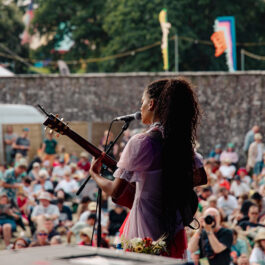Incredibly, June sees the 10th anniversary of Twitch, the livestreaming platform that has revolutionised the way we entertain ourselves.
The platform is most commonly associated with video games and esports, with millions of people broadcasting and watching for hours as creators play games, chat and generally hang out together, but it’s even more than that: Twitch has emerged as one of the biggest cultural disruptors of the past decade, smashing preconceptions about its audience. According to research, almost three quarters of Twitch users are under 35, with 41% in the 16-24 age range – running contrary to the notion that young people have short attention spans. In fact, livestreaming in general has shown that, for the right content, viewers are willing to devote many more hours than they would to traditional media, as we feel connected to the people we’re logging in to watch.
However, it’s not all gaming. Twitch and the livestreaming phenomenon have created new avenues of entertainment outside the latest PC or console hits. Performers from different worlds have come to these platforms to offer everything from long-form drama to craft tutorials, live events and even political engagement.
At a time when untold amounts of pre-recorded content are available at the touch of a button, the live experience has become even more valuable, with entertainment crafted from moment to moment – and greatly influenced by the audience watching. They have also gone on to infiltrate the mainstream, with creators securing television deals or selling out arenas based on success that was often masterminded in their own homes. Here, we look at the many ways Twitch has changed the world of entertainment.
Rolling The Dice
Of course, many Twitch superstars are gaming-based. All of the top subscribed channels on the platform have at least some connection to video games, but a revival in a different type of game has come about thanks to this format. Role-playing games such as Dungeons & Dragons have seen a boom period, partly thanks to a number of channels where live games unfold. Arguably the most successful is Critical Role, a channel with over 700,000 subscribers on Twitch, and 1.2 million on their supplementary ‘catch up’ YouTube page.
The concept is deceptively simple: a group of professional voice actors play Dungeons & Dragons on a live stream, using their talents to bring a fantasy adventure to life. The cast of notable voice talent (including The Last of Us stars Ashley Johnson and Laura Bailey) bring to life characters such as the rakish Scanlan (Sam Riegel) and the loveable Grog (Travis Billingham), as groups of mythical beings head out on multi-hour adventures, broadcast on Twitch every week to fans who interact and send in artwork inspired by the stories.
Critical Role’s campaigns have been huge hits, making stars of the cast including host/Dungeon Master Matthew Mercer, who brought talk show host Stephen Colbert into his own mythical world for a one-off charity special.
Perhaps the highest mark of their success, however, was a crowdfunding campaign to create an animated special. Fans responded overwhelmingly, funding the campaign to the tune of over $11 million (a record for a TV or film project) and turning the special into a multi-episode series which will debut in the future on Amazon’s streaming platform.
What started as a private game to celebrate castmate Liam O’Brien’s birthday has ultimately become an influence on the culture it celebrates. Numerous role-playing series have popped up on Twitch, including the popular Maze Arcana, and celebrities including Vin Diesel and Freddie Prinze Jr have appeared on various streams as both players and Dungeon Masters.
The popularity of Critical Role and the events of 2020 has led to a boom in interest in role playing games, with the makers of Dungeons & Dragons reporting their biggest year of sales thanks to new players taking up the hobby. What was once considered a byword for geekiness seems to have experienced a renaissance among creatively minded people looking for an interactive new adventure, inspired by the performances they see on their Twitch streams every week.
It isn’t entirely without incident, however. The D&D community often refers to “The Mercer Effect”, where new players arrive to the game with unrealistic expectations of an experience as polished and professional as that of Critical Role!
Let The Music Play
Another area of performance that seems to be perfectly suited for livestreaming is music, with fans tuning into concerts and shows virtually rather than physically. True, a stream of comments may not be the same as a roaring stadium, but it is more likely to catch your favourite artist’s attention. Whether it’s an unplugged set, an album reveal or an elaborate concert, the same principles apply – all you need are a camera feed and a good internet connection!
The platform has proven vital to the industry in the past year, with musical acts unable to perform in the traditional way or interact with their audiences in person. In March, metal band Code Orange may have played an empty venue in their hometown of Pittsburgh, but the number of people watching live would have filled many arenas worldwide. Their livestreamed gig attracted over 13,000 live viewers – and 300,000 more when it was posted on YouTube. Creating a concert movie/live broadcast hybrid meant their music was enjoyed in unprecedented circumstances by a fanbase looking to get something different from their viewing experience.
Steve Aoki and Calvin Harris are among the more famous names in a raft of DJs who have used the platform to play live sets, turning living rooms into private clubs, or simply soundtracks to evenings at home. However, top artists are doing more than live performances; last year, Grimes debuted her album Miss Anthropocene on her Twitch channel, playing the album in full and conducting a behind-the-scenes Q&A with fans. It was a big part of the process of getting closer to the fans, and no doubt helped the album to enormous success worldwide.
Twitch has also enabled lesser-known artists to grow their fan base and get support for their music. The democratisation of digital broadcasting makes it easier for unsigned bands and performers to build a following from around the world, not just their local music scene. Many artists have found income through the monetisation methods of Twitch and similarly themed sites such as YouTube, which also has a live stream equivalent. Far from anonymously consuming their art for free, acts have found music fans are putting their money where their mouth is, as a connection is made between performer and audience.
The Political Stream
It’s not just the world of entertainment that has taken advantage of the Twitch revolution. The public is more engaged in politics than ever, with social media making it easier and quicker to take action on the causes you believe in. Historically, however, politicians struggled to connect with younger voters, who often feel alienated from the political process. Incredibly, live streams have become a tool for politicians and activities to reach an audience, promote discussions, and raise money for charity. Not everyone is happy with this development – some see the involvement of politicians as an invasion of their space to escape from the real world – but many more have predicted that livestreaming may be the future of canvassing for elections.
In the run up to the 2020 US Presidential Election, popular representative Alexandria Ocasio-Cortez (nicknamed AOC) hosted a live Twitch stream that has gone down as one of the biggest events in the platform’s history, when taking into account on-demand viewers and those who caught up with the stream on YouTube. Rather than preach a particular agenda, AOC was taking part in an event to drive viewers to register to vote in what was seen as a pivotal election for the country. Over 400,000 people watched live, and millions more caught up with the Democratic Party politician as she played the game Among Us with various personalities from the site, chatted with viewers who posted questions, and generally showed a more off-guard demeanour that people don’t always associate with politicians.
The success of that stream has led others to dip their toe into the live stream waters. In April, French politicians Jean Castex, François Hollande, and Julien Bayou all appeared in a more formal setting on French political channels, to be interviewed about their views and policies. While it wasn’t quite as fun as playing video games, it was a chance for young French voters to steer the conversation towards topics that matter to them. It was also an opportunity for members of the establishment to reach out to future generations, as the engagement of younger voters has often been cited as a deciding factor in various elections around the world.
There has never been a time in history where so much information was available to so many people, and that can leave many of us overwhelmed. Live streams generally offer unfiltered honesty, stripping away the complexity of reports and analyses that come after the fact, allowing us all to be informed and involved in the direction of our societies.
Sporting Evolution
The live element of Twitch is the attraction for many – the sense that what you are watching is happening right now, and that you can even interact with it. It’s only logical, then, that a form of entertainment that has always been best experienced live should prove popular on the site.
For years, sport has been the preserve of expensive cable and satellite companies, but certain leagues are experimenting with bringing games to Twitch in order to reach a global fan base who can show their support by joining the chat section as well as cheering on at home. Of course, e-sports is at the heart of Twitch’s popularity, but traditional games are attempting to catch up.
Various companies have begun to experiment with showing live games on Twitch. Depending on the region and rights situation, viewers have been able to watch UEFA Champions League football, NBA and NFL games live. Twitch’s parent company, Amazon, has taken advantage of the rights gained for the Prime Video service to run certain events concurrently on Twitch.
Equally, leagues that might not sit very prominently on the TV guide have used the service as a way for curious fans to find games conveniently, and in a way that’s easy to get involved with. The world of ‘Sports Entertainment’ has fully embraced livestreaming, with various organisations such as Impact Wrestling showing entire weekly shows, while behemoth WWE has offered pay per view pre-shows.
As well as being able to see them on the pitch, athletes have also taken to Twitch in order to relax and talk with fans. In football, Fenerbahçe star Mesut Özil, Argentinian international Sergio Agüero, and Brazil’s captain, Neymar Jr, all have their own channels and can be found playing games such as Fortnite and Call of Duty. As is often the case with live broadcasts, headlines can be made: Agüero caused a stir on his channel when the Manchester City striker called his Argentina teammate Lionel Messi, and talked to him live on the stream. It appears even one of the greatest sportsmen who ever lived is not immune to the allure of livestreaming!
What’s Next?
Twitch’s success is derived from realising the ultimate potential of video streaming: choice. Those who visit the site can chat with sports stars, politicians, actors or simply fellow fans of the things they love. It also heralds the dynamism and possibilities of live events in a way that on-demand streaming services have not done before, bringing the appointment viewing of traditional TV and the accessibility of the internet together in an organic way. Tuning in to a live stream that you can influence and take part in will be the way of the future, as we enter an exciting new chapter of possibilities in entertainment.














Sorry, the comment form is closed at this time.